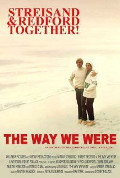
Directed by
Sydney Pollack
118 minutes
Rated PG
Reviewed by
Bernard Hemingway

The Way We Were
Depending on your mood Sydney Pollack’s 1970s classic will be either a delightfully old-fashioned love story or a mawkishly sappy romance. In its day most audiences went with the first reading and the film was a huge commercial success stamping Robert Redford in the mold of screen heartthrob and the title song winning an Oscar. Sentimental it is but The Way We Were is also a classy production
Barbra Streisand plays Katie Morosky, a committed young campus activist who in 1937 is a member of the Young Communist League and agitating for America’s involvement in the Spanish Civil War. Robert Redford plays Hubbell Gardiner, an irresistibly handsome varsity hot-shot and insouciant member of the privileged set to who life comes “too easily”. The two strike sparks but it is only many years later at the end of the war that they get together. We then follow their rocky relationship as, love notwithstanding, their differences tear them apart.
Although The Way We Were is far from being high drama, Arthur Laurents’ screenplay flows smoothly and yet is articulate thanks to the twinning of two intelligent characters, well played by the two leads. The film does become rather murky in the latter stages as the Gardiners find themselves in Hollywood at the time of the HUAC hearings, something which opens up their old differences. Even in the early 1970s when the Cold War was still far from over this latter material was still considered controversial and apparently substantial cuts were made, which no doubt explains the superficiality of this section of the film and the surprising rapidity with which the marriage between Katie and Hubbell comes apart.
Striesand as the overly serious Jewish girl is, as always, a vibrant presence and Redford is devilishly debonair in the best screen idol manner. Pollack, taking full advantage of the period story knows how to package his goods with old school charm given a modern spin (the scene in which Hubbell turns up at her apartment drunk and she tricks him into making love to her although he really doesn’t know what he is doing or who she is, is a particularly good example of this). If you are fond of Hollywood's studio-era romances you'll find much to enjoy here.
Want something different?





